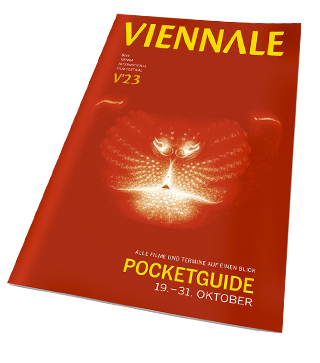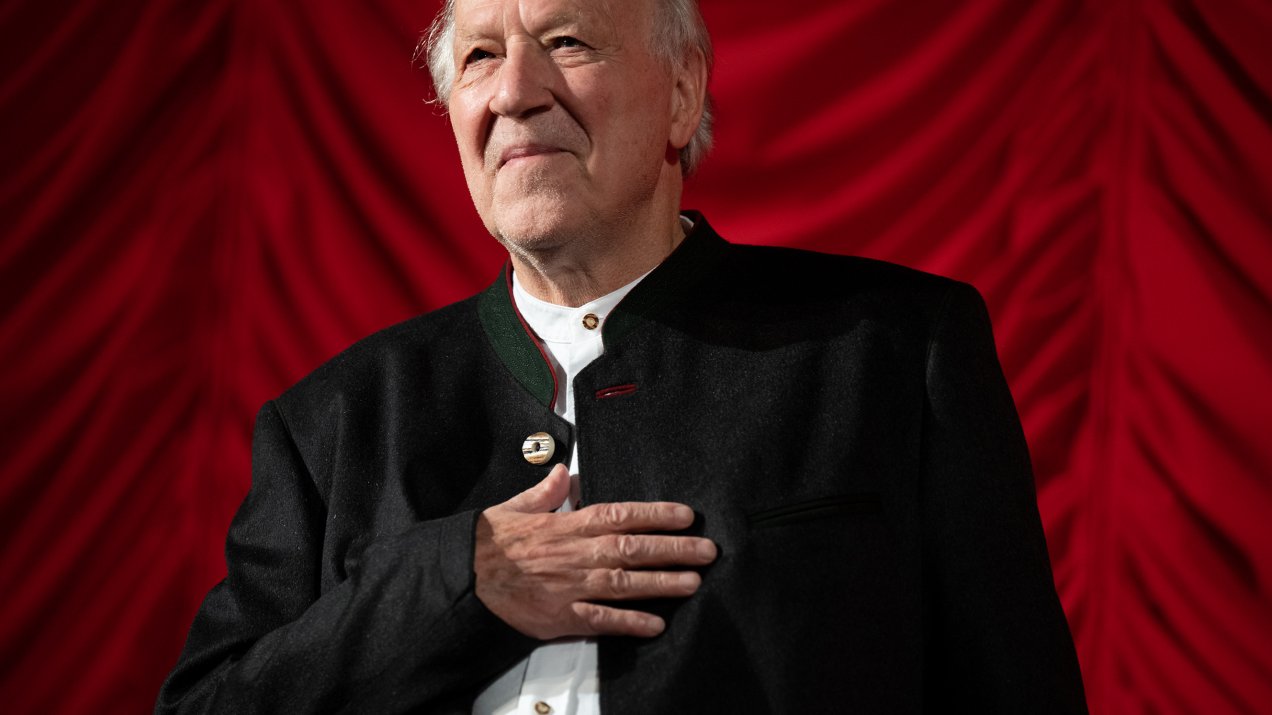In our VIENNALE DAILIES you'll find everything you need to know about what's happening around the festival!
Quote of the day
I don't work in a collaborative way,
especially not with actors
(Albert Serra)
NEED SOME FILMTIPS? HERE ARE SOME HIGHLIGHTS:
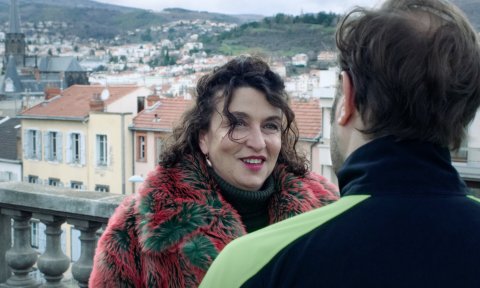
VIENS JE T’EMMÈNE
R: Alain Guiraudie
WED, 26.10. 6.15 pm : GARTENBAUKINO
Like all the great Christmas tales, VIENS JE T’EMMÈNE works as an utopia that unfolds within the fabric of the present, taking the form of a semi-absurd comedy. Winter is at its peak, and Médéric goes around town in skin-tight jogging pants and a top with fluorescent sleeves. He is the common link between all the crazy characters in this story, and what they share in turn is that they find him utterly irresistible. He himself chooses Isadora at the beginning of the film, a 50-year-old sex worker with whom he falls madly in love and with whom he never seems able to have sex: terrorists attacks, mafia-jealous husbands, homeless youngsters, prayer groups, insane neighborhood shootings, everything gets in the way. But these interruptions swiftly become plots, intrigues, urgent demonstrations of solidarity and more. Guiraudie takes on all the complications of a context, a city and its inhabitants and mixes them with chaotic bliss. Islamophobia is the main source of comedy, while the other is sexual confusion and desire. Have you ever heard that rancid phrase, “This film could not be made in 2022?” VIENS JE T’EMMÈNE works as its total opposite, a joyful game that plays with all the ideas that make up the confusions of today. (Lucía Salas)
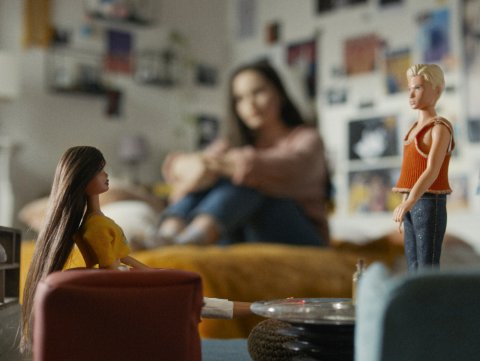
COMA
R: Bertrand Bonello
WED, 26.10. 9 pm: STADTKINO IM KÜNSTLERHAUS
THU, 27.10. 6 pm : FILMMUSEUM
Conceived as a concerned, exhilaratingly convoluted letter to his adolescent daughter, Bertrand Bonello’s COMA taps into the experiences of an unnamed teenage girl during the lockdown to explore the pressures exerted on an entire generation. Confined in a Parisian flat with her parents nowhere to be seen, each day blurs into the next for the young protagonist, there’s little for her to do other than lounge on the bed, speak to friends on FaceTime and catch up on the latest video from YouTube influencer Patricia Coma. The device she ordered from Coma is another way of passing the time, a cheap plastic game called the Revelator which never lets you lose, as is imagining romantic entanglements between those who inhabit the dollhouse that’s still in her room, tempestuous Barbies and Kens brought to life via stop-motion animation. But as days turn to weeks and each pastime bleeds into the others, violence starts seeping into everything too: brutal jealousy, a hand inserted into a food processor, a Zoom call intruder, a shadowy forest by night. Perhaps that’s the true horror of the pandemic: everything we see, everything we watch, everything we imagine, everything we dream, it’s all the same. There’s no escape. (James Lattimer)

CETTE MAISON
R: Miryam Charles
WED, 26.10. 11 am: URANIA
THU, 27.10. 4 pm: URANIA
A teenager is found hanged in her room in Bridgeport, a suicide that is in fact a crime, a crime that is in fact a piece of history. Many years after this loss, her cousin makes a film that both tells Tessa’s story and imagines her future that was taken away. What has been lost, broken, will never return, is the fabric of this film. With the substance of loss itself, it creates a world that has a texture like no other, so detailed that it can be felt through the eyes. Decades, centuries of sorrow leave traces, like how the sea erodes the stones. A mother and her long lost daughter share time, conversations, even a meal. Is time a tool for cinema, or is it the other way around?
CETTE MAISON creates a space where the dead and the living reunite. It makes a past and it makes a future. Lines and traces are found: Haiti, Canada and the United States are tied together by a map of images. In cinema, everything is possible, but not everything is likely to happen; and yet we are in this haunted house, in bliss and in horror. A house that resembles the darkest corner of a boat at night, where a group of young women tell each other stories to fall asleep while they wait for that new place they will have no choice but to call home. (Lucía Salas)
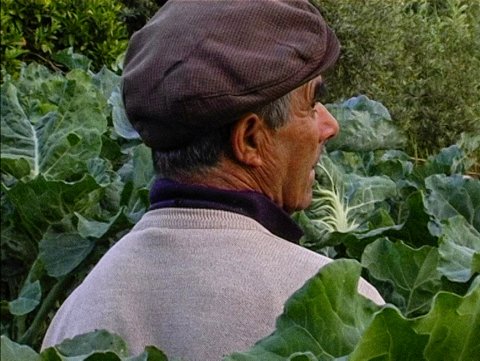
TERRA QUE MARCA
R: Raúl Domingues
WED, 26.10. 4 pm: METRO, HISTORISCHER SAAL
THU, 27.10. 1.30 pm: URANIA
For such a wordless film, it’s strange that TERRA QUE MARCA begins with words, although perhaps the idea is to reference their very insufficiency: “It is told that two wrongdoers came to serve their sentence by taking care of this land.” The film will not follow their story, but rather that of the land, although few stories dispense with standard structures to such ravishing effect. Survey or exploration might be better epithets, although they imply rigidity and empiricism when fluidity and digression are the order of the day. The camera simply scours the earth and observes all the processes it sees there, with gentleness, patience, calm: the picks that break up the soil, the slurry sprayed over it, the water channeled over its surface, the plants that push their way up through the sods, the hands that pick up the potatoes from the ground. On Mini-DV, everything looks at once closer and further away, the light, the textures, the colors, the dark. Not everything is idyllic here though, as soil can also be covered by concrete, trees can be felled, and when fire rages over earth, it doesn’t always stop. If the earth does indeed leave marks, on hands, hooves and bodies alike, each mark made in it carries its own weight in turn. (James Lattimer)
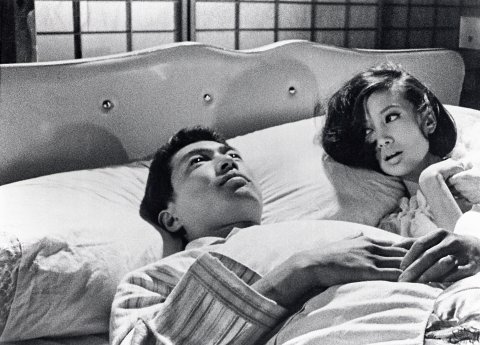
MIZU DE KAKARETA MONOGATARI
R: Yoshida Kijū
THU, 26.10. 8.30 pm: FILMMUSEUM
Yoshida’s first independent film after leaving the Shochiku Studio is based on a novel by Ishizaka Yōjirō depicting an incestuous mother-son relationship.
Matsutani Shizuo is an introverted office worker who lives alone with his beautiful mother Shizuka. Shizuka raised her son by herself, but has also been having an affair with Hashimoto, a powerful man in town. Shizuka and Hashimoto encourage Shizuo to marry Hashimoto’s daughter Yumiko, in whom Shizuo sees a resemblance to his mother and whom he suspects to be his half-sister. He marries Yumiko anyway but is torn between his wife and his mother. Intercutting Shizuo’s vacillations with flashbacks of his childhood and with dream sequences unveiling the protagonist’s desires, the film explores the sexual psychology of the highly Oedipal family relationships, using bold black-and-white photography and audaciously composed images. Turning independent enabled Yoshida to tackle controversial topics such as incest and sexuality which were shunned by the major studios. The exploration of female sexuality and identity was to become a central theme in his subsequent films, which he realized together with his wife, actress Okada Mariko. (Roland Domenig)
SOME OF OUR GUESTS TODAY

Miryam Charles
Director of
CETTE MAISON
Laure Giappiconi
Actress in
UN ÈTÉ COMME CA
Clara Bretheau
Director of
LES AMANDIERS
Liv Henneguier
Actress in
LES AMANDIERS
Thomas von Steinaecker
Director and Screenplay of
WERNER HERZOG - RADICAL DREAMER
Werner Herzog
Director of
THEATER OF THOUGHT
THE FIRE WITHIN:
A REQUIEM FOR KATIA AND MAURICE KRAFFT
Alain Guiraudie
Director of
VIENS JE T'EMMÈNE
WHAT IS HAPPENING AT THE VIENNALE CLUB TODAY?
from 9 pm: VINYL-BAR
ASMA AIAD (SALAM OIDA)
VIDEO OF THE DAY
With host Andrea Braidt and the audience, director Ruth Beckermann (MUTZENBACHER) and director Albert Serra (PACIFICTION) discussed their working methods and thoughts with regard to gender-specific representation in cinema.
VIENNALE PODCAST
Sexual healing? Mit Denis Côté
